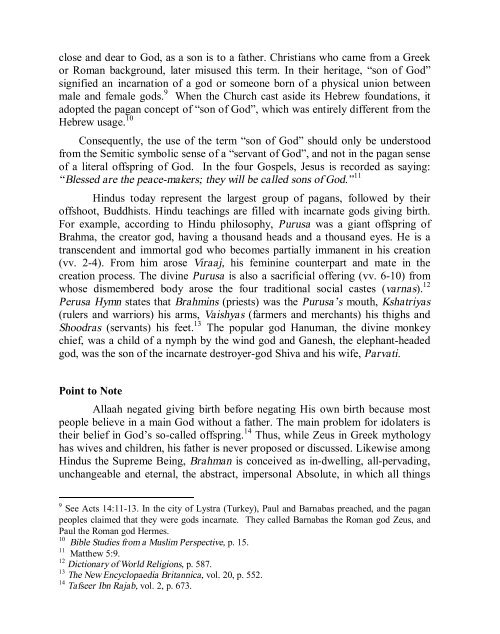Create successful ePaper yourself
Turn your PDF publications into a flip-book with our unique Google optimized e-Paper software.
close and dear to God, as a son is to a father. Christians who came from a Greek<br />
or Roman background, later misused this term. In their heritage, “son of God”<br />
signified an incarnation of a god or someone born of a physical union between<br />
male and female gods. 9 When the Church cast aside its Hebrew foundations, it<br />
adopted the pagan concept of “son of God”, which was entirely different from the<br />
Hebrew usage. 10<br />
Consequently, the use of the term “son of God” should only be understood<br />
from the Semitic symbolic sense of a “servant of God”, and not in the pagan sense<br />
of a literal offspring of God. In the four Gospels, Jesus is recorded as saying:<br />
“Blessed are the peace-makers; they will be called sons of God.” 11<br />
Hindus today represent the largest group of pagans, followed <strong>by</strong> their<br />
offshoot, Buddhists. Hindu teachings are filled with incarnate gods giving birth.<br />
For example, according to Hindu philosophy, Purusa was a giant offspring of<br />
Brahma, the creator god, having a thousand heads and a thousand eyes. He is a<br />
transcendent and immortal god who becomes partially immanent in his creation<br />
(vv. 2-4). From him arose Viraaj, his feminine counterpart and mate in the<br />
creation process. The divine Purusa is also a sacrificial offering (vv. 6-10) from<br />
whose dismembered body arose the four traditional social castes (varnas). 12<br />
Perusa Hymn states that Brahmins (priests) was the Purusa’s mouth, Kshatriyas<br />
(rulers and warriors) his arms, Vaishyas (farmers and merchants) his thighs and<br />
Shoodras (servants) his feet. 13 The popular god Hanuman, the divine monkey<br />
chief, was a child of a nymph <strong>by</strong> the wind god and Ganesh, the elephant-headed<br />
god, was the son of the incarnate destroyer-god Shiva and his wife, Parvati.<br />
Point to Note<br />
Allaah negated giving birth before negating His own birth because most<br />
people believe in a main God without a father. The main problem for idolaters is<br />
their belief in God’s so-called offspring. 14 Thus, while Zeus in Greek mythology<br />
has wives and children, his father is never proposed or discussed. Likewise among<br />
Hindus the Supreme Being, Brahman is conceived as in-dwelling, all-pervading,<br />
unchangeable and eternal, the abstract, impersonal Absolute, in which all things<br />
9 See Acts 14:11-13. In the city of Lystra (Turkey), Paul and Barnabas preached, and the pagan<br />
peoples claimed that they were gods incarnate. They called Barnabas the Roman god Zeus, and<br />
Paul the Roman god Hermes.<br />
10 Bible Studies from a Muslim Perspective, p. 15.<br />
11 Matthew 5:9.<br />
12 Dictionary of World Religions, p. 587.<br />
13 The New Encyclopaedia Britannica, vol. 20, p. 552.<br />
14 <strong>Tafseer</strong> Ibn Rajab, vol. 2, p. 673.














